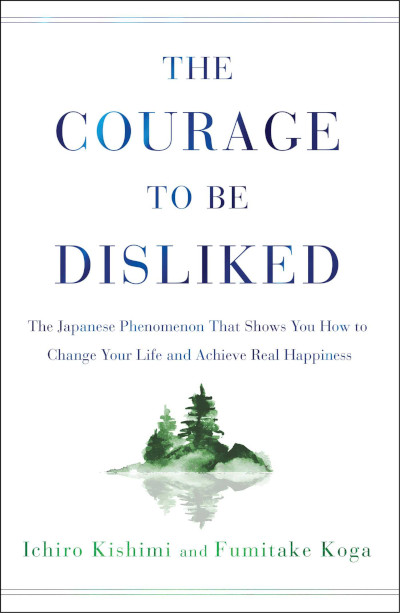The Courage to Be Disliked
Tags: psychology,
The Courage to Be Disliked is an introduction to Adlerian psychology in the form of a Socratic dialog. A young man who feels stuck and is unhappy with himself seeks the counsel of an older philosopher. He wants to know how he can find happiness and meaning in world where he never seems to measure up to the expectations of himself or others, a world in which the paths forward seem to both limited and uninviting and may lead to a life he ultimately doesn’t even want.

The philosopher gives the young man some sound advice, though the young man finds it initially hard to understand and even harder to accept. Your joy and your suffering, says the old philosopher, but come from your relationships with other people. The first thing you must do is to separate tasks. Understand what work in this world belongs to you and what belongs to others.
Your task is to grow–intellectually, emotionally, and spiritually–along whatever path works for you. Others may not like the path you choose or the decisions you make, but their feelings are their own tasks and none of your concern. Concern yourself only with what is within your power.
This has been said in various ways by various people over time. The authors quote Kurt Vonnegut and The Serenity Prayer: “Lord, give me the courage to change what I can change, the patience to accept what I cannot change, and the wisdom to know the difference.”
The courage to change is lacking in many people, because change can be scary. It’s scary to move into something new and unknown, and scary as well to risk the judgment and disapproval of others. Patience is also lacking, and like courage, requires quite a bit of practice and faith to achieve. Wisdom comes over time to the patient.
In youth, it’s especially hard to buck the expectations of the people and institutions that raised you. Many cultures promise fulfilling lives to those who follow the prescribed paths, and nothing at all to those who deviate. This is a problem to those whose idea of fulfillment differs from what society defines.
This book was written in Japan, where social roles are more rigid and confining than in the West. Defying the expectations of traditional roles incurs deep disapproval, hence the title of the book. The courage to be yourself involves the risk of being disapproved of, disliked, rejected.
But if you do have the courage to face that, it can be very liberating. When Ray Charles was asked how he was able to succeed as a musician in the face of American racial hostility, he said he had a mantra he used to repeat to himself. “No part of my self-worth depends on your approval of me.” That’s incredibly freeing, and it’s the exact attitude that the old philosopher tries to instill in the young man.
The book’s dialog and the way the philosopher presents ideas appear overly simplified at first, but the concepts slowly build, layer by layer, into a coherent and healthy attitude toward life. Unlike Freud’s psychology, which looks backwards and defines people in terms of trauma and dysfunction, Adler’s psychology looks forward and focuses on the practice of positive mental attributes like courage, acceptance, trust and community.
It’s not a psychology that says, “Let’s dig deep into the messed-up past that turned you into the messed-up person you are today.” Instead, it asks, “What kind of life do you want? What tools do you already possess that can help get you there? And how can you best employ those tools?”
This, to me, seems like a more practical and fruitful approach to psychology. The philosopher, like Socrates, questions the young man about his attitudes, thoughts, perspectives, assumptions and values. These are the things preventing him from finding fulfillment, and from recognizing it when it exists. They are all in his power to change.
Ultimately, like the Buddhists and Taoists, the young man comes to realize that life is not something he has to go out and achieve. It’s something he already has. Alan Watts titled one of his books, “Become Who You Are.” That seems to be the primary task of Adlerian psychology: becoming who you are within the context of the community in which you exist.
Neither Adler nor the authors advocate a libertine or hedonist philosophy. Become who you are doesn’t mean do whatever you want and to hell with everyone else. Individuals exist within a community, and among your tasks, one of the paramount ones is to recognized and define that community as broadly as possible, and to contribute to it in whatever ways accord most truly with your nature.
The book, of course, can only point you in the right direction, giving you the perspective you need to find growth and fulfillment, and some tools to help you along your way. Ultimately, it’s up to you to put in the work, and it’s lifelong work.
The authors say that it takes about half of you current lifespan to fully digest and be transformed by this way of thinking and living. That is, if you pick it up at twenty, you may have a full grasp of what it means to truly live this philosophy by age thirty. If you pick it up at forty, you may not find you fully understand until age sixty. But in either case, once you get the basics, the transformation begins immediately.
In our current age of anxiety and strife, I can see this book being especially helpful for the young. Courage, acceptance, trust and community are very much lacking in American society today, and we could benefit from a healthy dose of all four.